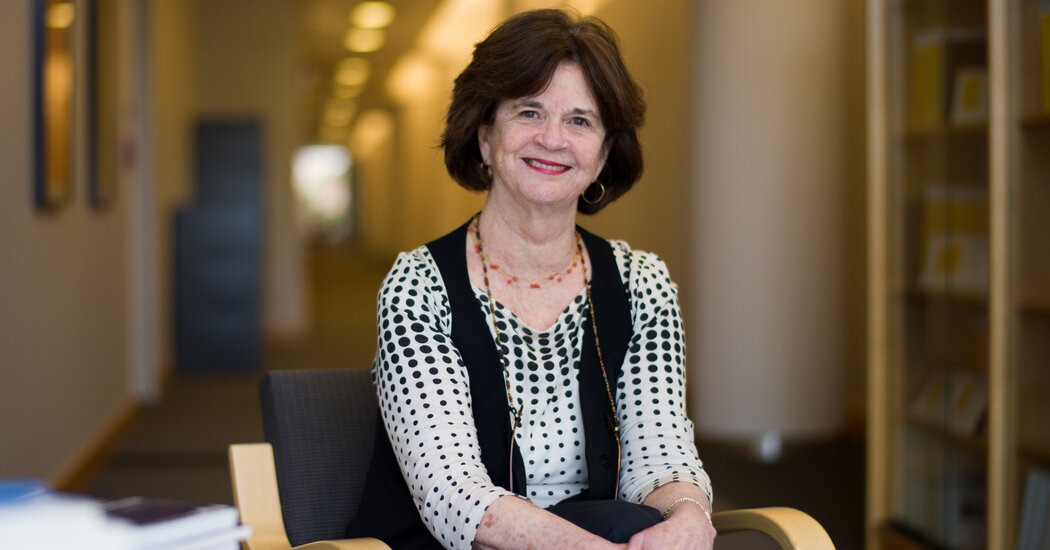A Princeton sociologist and a single mother herself, she brought her own experience to her wide body of scholarly work.
Sara McLanahan, a Princeton sociologist whose landmark studies of households led by one parent — much of which suggested poorer outcomes for children born to single mothers — laid the groundwork for research into the changing structure of the American family, died on Dec. 31 at her home in Manhattan. She was 81.
The cause was lung cancer, her husband and research partner, Irwin Garfinkel, said.
Dr. McLanahan’s research grew in part out of her personal experience as a single mother to three children, but it was also driven by her disappointment at the limited data available on single motherhood at the time. She was further prodded into action by an article she read.
While completing a postdoctoral fellowship at the University of Wisconsin, Dr. McLanahan came across “The Underclass,” a 60,000-word article by Ken Auletta that appeared in three consecutive issues of The New Yorker in 1981. (It was later expanded into a book.) In it Mr. Auletta argued that the “weakened family structure of the poor’’ was a major reason for poverty in the country.
She set out to design her own studies, hoping to contradict the thesis of “The Underclass.” But her research consistently found that single motherhood came with increased risk of income loss, conflict and poorer overall outcomes.
“Her research showed that growing up in this single-parent family, even as you control for as much of the observables that you could possibly do with data, was damaging,” Dr. Garfinkel said in a phone interview. “And children did less well, and that was not very welcome news.”
Despite that conclusion, Dr. McLanahan remained optimistic. She turned her sociological eye to public policy solutions. She pushed for mental health services for unmarried mothers as well as universal health care for children.
Her best-known work was the Fragile Families and Child Wellbeing Study, which in 1988 took a longitudinal look at 5,000 children, primarily in households led by single mothers.
The study, which she co-founded with Dr. Garfinkel and the Columbia University researcher Ron Mincy, identified major disparities in life outcomes — which she termed “Diverging Destinies” — between children with more involved mothers and those born to mothers with fewer resources and less time. She used four primary variables: mother’s age, mother’s employment, single motherhood and father’s involvement. The study over-sampled for single motherhood, using what researchers term “marital births” as a smaller control group.
Older, more educated mothers who had jobs and who involved the children’s fathers led to better cognitive and social outcomes for their children, the study found; mothers who had children young and had more unstable relationships with the children’s fathers were correlated with worse outcomes. And, Dr. McLanahan argued, the gaps between the groups of children were widening.
Dr. Garfinkel said the results of the Fragile Families study “provide no support for the culture of poverty thesis,” which posits that different values and behaviors among the poor trap them in self-perpetuating cycles of privation. Rather, he said, “circumstances and opportunities,” not value differences, have the greatest impact.
Though her findings rankled some advocates for single mothers, Dr. McLanahan continued to publish books and papers on the topic.
“We reject the argument that people should not talk about the negative consequences of single motherhood for fear of stigmatizing single mothers and their children,” Dr. McLanahan and the researcher Gary Sandefur wrote in their 1994 book, “Growing Up With a Single Parent: What Hurts, What Helps.” “While we appreciate the compassion that lies behind this position, we disagree with the bottom line. Indeed, we believe that not talking about these problems does more harm than good.”
Sara Frances Smith was born on Dec. 27, 1940, in Tyler, Texas. Her father, Norman Smith, was a general manager for a local oil company. Her mother, Iredell (Brown) Smith, was a homemaker.
She attended Robert E. Lee High School in Tyler, now known as Tyler Legacy High School. A gifted pianist, she studied at the Aspen Music Festival in Colorado for a summer. She attended Bennett Junior College in Irvington, N.Y., and went on to Smith College. After a year at Smith, she dropped out in 1962 and married Ellery McLanahan. They had three children, Sara, Ellery and Anna Bell, all of whom survive her. The family moved to Houston, and the couple divorced in 1972.
Dr. McLanahan returned to school and graduated from the University of Houston with a bachelor’s degree in sociology in 1974. She received her masters and doctoral degrees in sociology from the University of Texas at Austin.
She began her postdoctoral fellowship at the University of Wisconsin in 1979. It was there that she met Dr. Garfinkel and focused her research on single motherhood. (She had avoided the topic in her doctoral thesis at the University of Texas because, she said, it felt too close to home.) She and Dr. Garfinkel married in 1982.
After completing the fellowship, Dr. McLanahan remained in Wisconsin as an assistant professor in sociology and became a full professor in 1989. She began her tenure at Princeton in 1990, and Dr. Garfinkel moved on to Columbia University. At Princeton, she was a founder of the Bendheim-Thoman Center for Research on Child Wellbeing.
In addition to her husband and children, she is survived by her stepdaughters, Leah Matthew and Lynn Garfinkel, and five grandchildren.
The Fragile Families data set has been used in nearly 1,000 published papers, according to a remembrance by the National Council on Family Relations, of which Dr. McLanahan was a member.



























